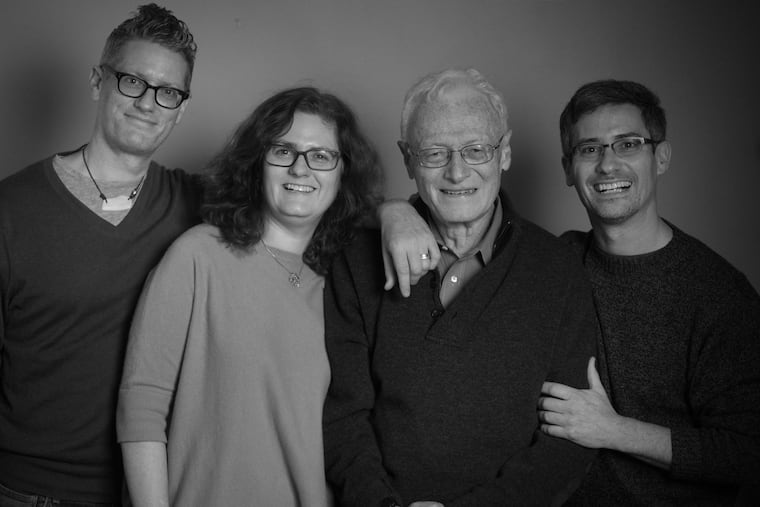Neal Nathanson, pioneering researcher on polio and HIV/AIDS, and retired vice dean and vice provost at Penn, has died at 94
"His contributions, mentorship, and collegiality will be long remembered by those with whom he worked, and his legacy will continue through future generations," a former colleague said in a tribute.

Neal Nathanson, 94, formerly of Philadelphia, pioneering researcher on polio and HIV/AIDS, retired vice dean and vice provost for research at the University of Pennsylvania, former chair of the school’s department of microbiology, associate dean of the Perelman School of Medicine’s global health programs, professor emeritus, and author, died Thursday, Aug. 11, of leukemia and pneumonia at his home in Cambridge, Mass.
Renowned worldwide for his study of HIV/AIDS and the improvement of vaccines for polio, Dr. Nathanson was an expert in virology, epidemiology, and public health. Beginning in the 1950s and throughout his 22 years at Johns Hopkins University and more than three decades at Penn, he completed extensive research on many infectious diseases and in 1998 became director of the office of AIDS research for the National Institutes of Health.
He served on the polio surveillance unit at the Communicable Disease Center, known today as the Centers for Disease Control and Prevention, in the 1950s, wrote definitive papers on polio, HIV, and other topics, and told The Inquirer in 1998: “An AIDS vaccine is now one of the most urgent needs in all of biomedical research.”
» READ MORE: Listen to a podcast interview with Dr. Nathanson
Dr. Nathanson joined Penn in 1979 and served as chair of the department of microbiology for 15 years. He became vice dean of research in 1995, vice provost of research in 2000, and was associate dean of global health programs from 2004 to 2014. Colleagues praised his ability to turn research into innovation and noted his “combination of world-class personal research and science policy experience.”
“The challenge,” he told the Daily News in 2000, “is to convert all of this new knowledge into things that are in the public interest.”
Penn’s departments of microbiology and neurology created the Neal Nathanson lectureship in his honor in 2002, and former colleague Francisco Gonzalez-Scarano said: “His ability to listen carefully and provide selfless advice on many academic and scientific subjects was legendary.” Another former colleague, Glen Gaulton, told the Penn Almanac: “He was an irascible iconoclast.”
Before Penn, Dr. Nathanson was head of the division of infectious diseases in the department of epidemiology in the school of public health at Johns Hopkins. A lifetime advocate for women and girls, he hired Susan Weiss as an assistant professor at Penn in 1980 and encouraged her work, then relatively obscure, with coronaviruses.
» READ MORE: Watch Dr. Nathanson talk about his impactful career in this video
“Neal thought it was important to study viruses just to learn about how they interact with host cells even when the relevance to human disease was not obvious,” Weiss said. “I continued to communicate even during the pandemic when he had lots of thoughts and questions about coronaviruses. I will miss Neal a lot.”
Dr. Nathanson was a member of many organizations and served as president of the American Epidemiological Society. His many awards include the Perelman School of Medicine’s 2014 Special Dean’s Award, a Research Career Development Award from the U.S. Public Health Service, and the Javits Neuroscience Investigator Award from the National Institutes of Health.
He also published many papers and articles, was editor-in-chief of the American Journal of Epidemiology, cofounded the Epidemiologic Reviews journal, and published the Viral Pathogenesis research textbook in 1997. “He was concerned about making sure that everybody got treated and had clinical care,” his daughter, Kate, said. “He was always asking: ‘Can we make things better?’”
Born Sept. 1, 1927, in Boston and raised in Cambridge, Dr. Nathanson went to Harvard University and earned his bachelor’s degree in biochemistry in 1949 and medical degree in 1953. He pursued his clinical training at the University of Chicago and his postdoctoral training in virology at Johns Hopkins, and served two years in the military as an epidemic intelligence service officer.
He married Constance Allen, and they had daughter Kate and sons John and Daniel. After a divorce, he married Phoebe Starfield Leboy. She died in 2012, and he married Valerie Epps in 2018.
Dr. Nathanson liked to sail, visit museums, vacation on the beach in Nantucket, and read Charles Dickens. He collected clocks and watches, doted on his children and grandchildren, and had an amazing memory and rollicking sense of humor.
“My dad understood how fortunate he was in his life,” his son John said in a tribute. “And we were all fortunate in having him as a father, a husband, a brother, and a friend.”
In addition to this wife, former wife, and children, Dr. Nathanson is survived by seven grandchildren, a brother, and other relatives.
A celebration of his life is scheduled for 3 p.m. Friday, Oct. 14, at the Perelman Center for Advanced Medicine, 3400 Civic Center Blvd., Philadelphia, Pa. 19104.
Donations in his name may be made to the Neal Nathanson lectureship, Penn Medicine Development, c/o Andrew Bellet, 3535 Market St., Suite 750, Philadelphia, Pa. 19104. Make checks to Trustees of the University of Pennsylvania.